
Jamieson "Junior" Brown is an American country guitarist and singer. He has released twelve studio albums in his career, and has charted twice on the Billboard country singles charts. Brown's signature instrument is the "guit-steel" double neck guitar, a hybrid of electric guitar and lap steel guitar.

Red Headed Stranger is the eighteenth studio album by American outlaw country singer Willie Nelson, released in 1975. Following the success of his recordings with Atlantic Records, coupled with the negotiating skills of his manager, Neil Reshen, Nelson signed a contract with Columbia Records, the label that gave him total creative control over his works. The concept for the album was inspired by the "Tale of the Red Headed Stranger", a song that Nelson used to play as a disc jockey on his program in Fort Worth, Texas. After signing with Columbia, he decided to record the song, and arranged the details during his return to Austin, Texas, from a trip to Colorado. It was recorded at low cost at Autumn Sound Studios in Garland, Texas. The songs featured sparse arrangements, largely limited to Nelson's guitar, piano, and drums. Nelson presented the finished material to Columbia executives, who were dubious about releasing an album that they at first thought was a demo. However, Nelson had creative control, so no further production was added.
Gary Ronnie Stewart was an American musician and songwriter, known for his distinctive vibrato voice and his outlaw country sound influenced by southern rock. At the height of his popularity in the mid-1970s, Time magazine described him as the "king of honkytonk." He had a series of country chart hits from the mid- to late 1970s, the biggest of which was "She's Actin' Single ", which topped the U.S. country singles chart in 1975.
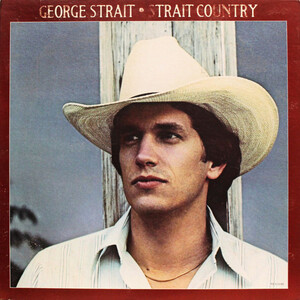
Strait Country is the debut studio album by American country music artist George Strait, released on September 4, 1981, by MCA Records. The album's traditional country music approach—a mix of Texas honky tonk and the Bakersfield sound—presented a sharp contrast to the dominating trends within country music at that time. The album includes the singles "Unwound", "Down and Out", and "If You're Thinking You Want a Stranger ". The album peaked at number 26 on the US Billboard Top Country Albums chart. Strait Country has been certified platinum by the RIAA. The album was one of the first to be recorded and mixed digitally.

Shotgun Willie is the 16th studio album by American country music singer-songwriter Willie Nelson, released on June 11, 1973. The recording marks a change of style for Nelson, who later stated that the album "cleared his throat". When Nelson refused to sign an early extension of his contract with RCA Records in 1972, the label decided not to release any further recordings. Nelson hired Neil Reshen as his manager, and while Reshen negotiated with RCA, Nelson moved to Austin, Texas, where the ongoing hippie music scene at the Armadillo World Headquarters renewed his musical style. In Nashville, Nelson met producer Jerry Wexler, vice president of Atlantic Records, who was interested in his music. Reshen solved the problems with RCA and signed Nelson with Atlantic as their first country music artist.
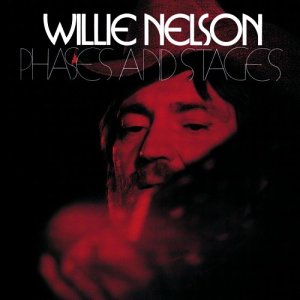
Phases and Stages is the 17th studio album by American country music singer-songwriter Willie Nelson, released in March 1974. It followed the moderate success of his first Atlantic Records release, Shotgun Willie. Nelson met producer Jerry Wexler at a party where Nelson sang songs from an album he planned to record. The single "Phases and Stages" was originally recorded the same year. Nelson recorded the album at Muscle Shoals Sound Studios in two days and Wexler produced it.
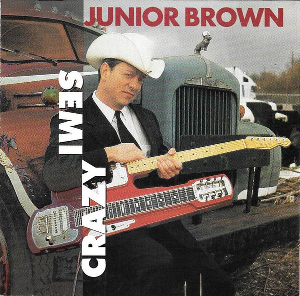
Semi Crazy is an album by the American musician Junior Brown, released in 1996. It contains the crossover hit "Surf Medley", featuring three popular surf rock songs.

Hungry Again is the thirty-fifth solo studio album by American singer-songwriter Dolly Parton. It was released on August 25, 1998, by Decca Records and Blue Eye Records. The album was produced by Parton and her cousin, Richie Owens. It is seen as a predecessor to Parton's critically acclaimed bluegrass trilogy, The Grass Is Blue, Little Sparrow, and Halos & Horns.

The Rolling Stones' US Tour 1978 was a concert tour of the United States that took place during June and July 1978, immediately following the release of the group's 1978 album Some Girls. Like the 1972 and 1975 U.S. tours, Bill Graham was the tour promoter. One opening act was Peter Tosh, who was sometimes joined by Mick Jagger for their duet "Don't Look Back". The Outlaws backed up Peter Tosh. Another act opening was Etta James, famous for her song "At Last".

Honky Tonk Angels is a collaborative studio album by Dolly Parton, Loretta Lynn and Tammy Wynette. It was released on November 2, 1993, by Columbia Records. The album was certified Gold by the RIAA on January 5, 1994, for sales of 500,000 copies.

Honky Tonk Heroes is a country music album by Waylon Jennings, released in 1973 on RCA Victor. With the exception of the final track on the album, "We Had It All", all of the songs on the album were written or co-written by Billy Joe Shaver. The album is considered an important piece in the development of the outlaw sub-genre in country music as it revived the honky tonk music of Nashville and added elements of rock and roll to it.

Mark Nelson Chesnutt is an American country music singer and songwriter. Between 1990 and 1999, he had his greatest chart success recording for Universal Music Group Nashville's MCA and Decca branches, with a total of eight albums between those two labels. During this timespan, Chesnutt also charted twenty top-ten hits on the Billboard Hot Country Songs charts, of which eight reached number one: "Brother Jukebox", "I'll Think of Something", "It Sure Is Monday", "Almost Goodbye", "I Just Wanted You to Know", "Gonna Get a Life", "It's a Little Too Late", and a cover of Aerosmith's "I Don't Want to Miss a Thing". His first three albums for MCA along with a 1996 Greatest Hits package issued on Decca are all certified platinum by the Recording Industry Association of America (RIAA); 1994's What a Way to Live, also issued on Decca, is certified gold. After a self-titled album in 2002 on Columbia Records, Chesnutt has continued to record predominantly on independent labels.
"Like the Rain" is a song co-written and recorded by American country music artist Clint Black. It was released in September 1996 as the first single from his Greatest Hits compilation album. The song became his 23rd chart single, and in October of that year, it became his tenth Number One hit on the Billboard Hot Country Singles & Tracks charts. It held that position for three weeks. At the 1997 Grammy Awards, "Like the Rain" was nominated for the Best Male Country Vocal performance. The song was written by Black and Hayden Nicholas.
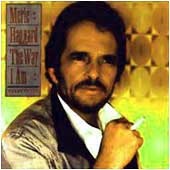
The Way I Am is the thirtieth studio album by American country music artist Merle Haggard, released in 1980.

Yesterday's Wine is the 13th studio album and a concept album by country singer Willie Nelson. Nelson had been recording for RCA Victor since the early 1960s, and had released no significant hit records. By 1970, his recordings had reached mid-chart positions. Nelson lost the money he made from his song-writing royalties by financing concert tours that were generally unsuccessful and unprofitable. In addition to problems with his music career, Nelson had a troubled personal life. He had divorced his wife, Shirley Collie, and his Tennessee ranch had been destroyed by a fire.

Just One Love is a studio album by the American country singer Willie Nelson, released in 1995. Ten of the songs are covers of pre-rock 'n' roll country and honky tonk.

Night and Day is the 46th album by the country musician Willie Nelson, released in 1999. It is an instrumental album.

Live at Billy Bob's Texas is a 2004 album by country singer Willie Nelson. It was recorded at Billy Bob's, a popular country music nightclub in Fort Worth, Texas, United States.

Hey, Where's Your Brother? is an album by the American musician Johnny Winter. It was released in 1992 by Point Blank Records. Edgar Winter played on three of the album's songs. The brothers supported the album by jointly playing several shows. The first single was "Johnny Guitar".
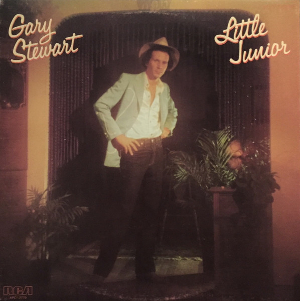
Little Junior is an album by the American musician Gary Stewart, released in 1978. It peaked at No. 35 on Billboard's Top Country Albums chart. The first single was "Whiskey Trip". Stewart supported the album with a North American tour.

















